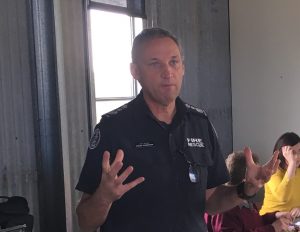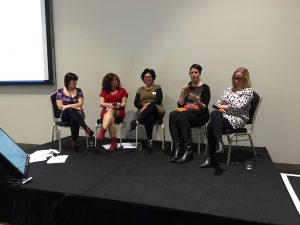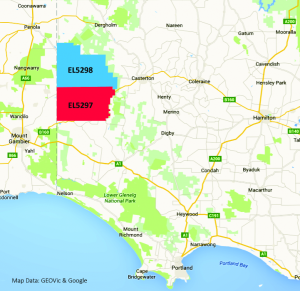The Hamilton Spectator – October 31, 2015
SOUTH-WEST COAST state by-election candidates have all agreed that
local roads are in a terrible state, especially around the Macarthur and
Condah areas that have seen heavy freight use in recent years.
Most of the 10 candidates that spoke to The Spectator about local transport issues this week have advocated for a new system of funding allocation for road works, with many calling for an end to temporary ‘patch ups’.
South-West Coast goes to the polls today, but 42 per cent of voters have already cast their ballot by pre-poll or postal vote.
Liberal candidate Roma Britnell and Nationals candidate Michael Neoh both called for the return of the $160 million ‘Country Roads and Bridges’ program, which provided funds to local governments.
“The community are saying that roads are bad and I agree 100 per cent,” Ms Britnell said.
“But over the last 16 years the Liberals have been in government for four, with Labor in for 12.”
Ms Britnell said the previous Coalition Government had “committed $2.6
million to Myamyn-Macarthur Rd, which Labor pulled.”
A spokesperson for Victoria’s Roads Minister said previously that “two
locations along Myamyn-Macarthur Rd, totalling 1.7km of road, will be
resurfaced in 2015/16.”
Mr Neoh said the Country Roads and Bridges Program should return, but
with $80 million spent over 12 months instead of two years.
“I have asked Jim Cooper from Port of Portland what his priority is and he
said it was the roads outside Portland,” Mr Neoh said.
“Talking to people from those areas, I have also heard the need for emergency repairs.
“I’m calling for half of (Country Roads and Bridges) to be pushed
forward into the first 12 months. There needs to be emergency repairs before we even get to upgrades.”
Independent candidate, Roy Reekie, who has run for Labor in the past, said one of the three key points in his transport plan was “proper investment and repair of roads, not just patch ups”.
Another of his key points was to “get more freight off roads and onto rail”.
“Now we are starting to have B-triples up to 75 tonnes. The roads not designed for this and it’s tearing them apart,” he said.
Greens candidate Thomas Campbell called for a survey of local road quality, combined with consultations with community members and industries, to help direct roads funding.
“Realistically, you have got to find a balance between making our roads safe for cars and trucks, and getting more freight onto rail,” he said.
“We can’t keep building roads endlessly if we can’t maintain all of the ones we have,” Mr Campbell said.
Independent candidate Pete Smith said he had proven and award-winning
experience in securing roads funding, which was needed as local roads were “appalling”.
“I have driven on them myself. They are not just appalling, they are downright dangerous,” he said.
“The situation is exactly the same in many other electorates, but the
marginal areas will get money before we do. The Coalition assumes they
have got it in the bag and Labor is not even trying.”
“Stop treating by-elections like a football game by barracking for your
old team; put your family’s welfare first.”
Mr Smith said that when he was a director of RAC South Australia, he worked on what he called “the largest roads funding campaign in Australia’s history”.
He received a national award for helping boost Victoria’s grant road
share from $2.6m in 1991/92 to $103m in 1994/95.
“I know how to get roads funding. People say ‘I’m going to get more
roads funding’, but I’ve actually done it,” he said.
Independent candidate Rodney Van De Hoef said the speed limit along
the main road at Condah should be reduced from 100 to 80 kilometres per hour as “it’s dangerous for community and those crossing the road”.
“The government will put up 80km/h for a bump in the road, why not this
intersection of major roads?”
Mr Van De Hoef also proposed to get more freight on rail by with an “intermodal/bulk freight hub at Heywood” that could also store shipping containers for the Port of Portland.
Independent candidate Swampy Marsh called for a protest campaign
aimed at the Victorian Premier and Parliament House.
“I’d hold (Premier) Daniel Andrews down by the throat until he promises
to listen,” Mr Marsh said. “You can have all the policies in the world but it won’t matter if people don’t listen.”
Mr Marsh said South-West Coast was in danger of falling behind in
funding because “the government won’t even run a candidate; they haven’t backed Roy Reekie, their losing candidate for the last four elections”.
“If it stays a Liberal seat, they won’t care. It’s got to be independent. You
have got to make them scared,” he said.
“You and I both know that the state of the roads is appalling, but we have
had 26 years of Liberal members, including 10 years in government, and they have done nothing.
“They even had the Roads Minister’s seat in Polwarth, and the Premier’s
seat right next to him, and it didn’t change.”
Mr Marsh said the region “should get a dump truck full of bitumen and
take it to Parliament House” to get media attention because “Labor is too
city-centric, and the Liberals won’t get off their arses”.
Jim Doukas, of the Australian Country Party, said in the local region
“it’s got to the stage where both rods and rail are completely buggered”.
“The State (Government) and Feds, they only fund the big projects like
highways but they should fund everything,” he said.
“The roads in places like Condah, Macarthur and towards Hotspur,
they’ve got to be fixed.
“It’s gotten to the stage where you can’t say we’ll fix some of them because they all need fixing.”
Animal Justice Party candidate Jennifer Gamble said the Princes
Hwy should be duplicated and major works should occur on the Hamilton
Hwy because it was “dangerous” and “the road shoulders are a hazard”.
“I’ve just been to Hamilton and it was a bumpy drive,” she said
She also said the Macarthur area had “too many rough surface signs put
up” and needed road works instead.
Independent Michael McCluskey, said “nearly every single road in the
south west is in a state of disrepair”.
He proposed two things, one of which was “we have to prioritise
funding to get a system for upgrading roads” and the other was “get freight off trucks as part of the solution” as “one 18-wheeler is equivalent to 5000 cars”.
The Australian Christians party has not responded to a request for
comment from its candidate Lillian Len.





